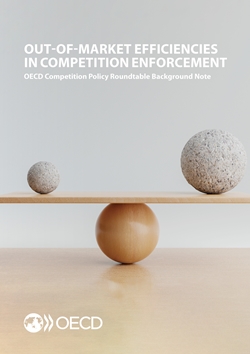Competition
Out-of-Market Efficiencies in Competition Enforcement
Read the background note |
Out-of-market efficiencies affect consumers or other economic agents in different markets from those in which anticompetitive effects are alleged to occur in the context of a merger, an anticompetitive conduct, or an agreement. It is traditionally considered that out of market efficiencies should not be recognised in mergers and in cases of anticompetitive conduct. There is, however, a growing debate about the merits of recognising these efficiencies in competition cases. The increasing focus of competition authorities and of the broader competition policy community on sustainability considerations and on multi-sided markets contributes to this renewed interest. The lack of recognition of out of market efficiencies is also seen by some analysts as not reflecting real markets, where businesses do not behave on the basis of strict demarcations between relevant markets, and is sometimes seen to be incapable of capturing the reality of multi-sided markets. At the same time, the link between out of market efficiencies and the relevant market under investigation may be harder to establish. For this reason, broadening the definition of efficiencies could raise issues of administrability and legal certainty, as the assessment and the outcome of a case could become more subjective. In December 2023, the OECD held a roundtable on out-of-market efficiencies in competition enforcement to discuss the arguments in favour and against expanding the notion of relevant efficiencies to out of market efficiencies. Key takeaways from the discussion
This page contains all related documentation. See the full list of best practice roundtables on competition. |
|
Speakers
Daniel Crane Bio John Davies Bio Nancy Rose Bio Nicole Rosenboom Bio |
Documents
OECD Background Note | Note de référence de l'OCDE Detailed Summary of the discussion EN | FR Executive Summary with key findings EN | FR
Contributions from delegations |
|||
|
Presentations
|
||||
|
Related material
Competition in the Circular Economy (2023) Environmental Considerations in Competition Enforcement (2021) Sustainability and competition (2020) Competition issues in labour markets (2019) Advantages and Disadvantages of Competition Welfare Standards (2023) The Role of Efficiency Claims in Antitrust Proceedings (2012) |
See also
|
|||
Related Documents

